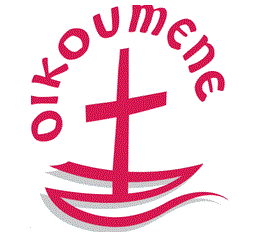August 23: What Is a Church?
World Council of Churches Formed (1948):
What is a Church?
 It was on this date, August 23, 1948, that the World Council of Churches was formed in Amsterdam, Holland. Over 100 Protestant churches agreed to tolerate each other's existence at an ecumenical conference in 1937. The next year, a provisional committee met at Utrecht to form the council, but World War Two forced a postponement until 1948, when, after centuries of dividing up like cancer cells, 147 Protestant churches from 44 countries created the WCC. Today the membership is 341 churches from over 100 countries, excluding the single largest Christian Church: the Roman Catholic.
It was on this date, August 23, 1948, that the World Council of Churches was formed in Amsterdam, Holland. Over 100 Protestant churches agreed to tolerate each other's existence at an ecumenical conference in 1937. The next year, a provisional committee met at Utrecht to form the council, but World War Two forced a postponement until 1948, when, after centuries of dividing up like cancer cells, 147 Protestant churches from 44 countries created the WCC. Today the membership is 341 churches from over 100 countries, excluding the single largest Christian Church: the Roman Catholic.
Tolerance does not come naturally to churches competing for membership, so the effort to "agree to disagree" on points of doctrine must certainly be applauded. However, the Council has its critics. The Fundamental Evangelistic Association berates the Council for "apostasy" and criticizes the organization for "doctrinal deviations and political radicalism" – even calling this collection of churches "a modern Tower of Babel."*
There is a sort of internal logic to the evangelical critique: how, indeed, can a church be called Christian if, as the WCC does, membership is not predicated on either sincerity of belief in God and Jesus, or even the three-headed God? "How can anyone," the evangelicals ask, "claim to be Christian who denies the Trinity?" This may include the Bible, which neglects any mention of the Trinity.
To Freethinkers, this sounds like an internal squabble. The unasked question is: What is a church?
Slavic and Germanic–
Czech: církev
Danish: kirke
Dutch: Kerk
Estonian: kirik
Finnish: kirkko
German: Kirche
Norwegian: kirke
Polish: kosciol
Swedish: kyrkaLatin / Romance–
French: église
Italian: chiesa
Portuguese: igreja
Spanish: iglesiaUrdu and Indonesian seem close to the Germanic root with girja and gereja, respectively; Hungarian approaches the Romance root with egyház; Romanian prefers a word rooted in "basilica": bisericã.
It is generally agreed that the word in Slavic and Germanic languages comes from the Greek κυριακων (kyriakon) – through Old English cirice to Middle English chirche – originally meaning "house of the Lord." The Latin-based (Romance) languages turned toward the Greek word εκκλησια (ekklesia), meaning conference or assembly, which originally indicated a secular assembly of the people of Israel.
But the Greek word for church, in the sense of a Christian house of worship, has been in use only since about 300 CE. This makes a clear forgery of the famous founding phrase on which the Christian Church is based: "And I say also unto thee, That thou art Peter (πετρος), and upon this rock (πετρα) I will build my church; and the gates of hell shall not prevail against it" (Matthew 16:18).** If Jesus had actually used the word ekklesia, or its nearest Aramaic or Hebrew equivalent, he would not have been understood.
As an assembly of people called out for a common purpose (the εκκλητοι or ekkletoi), "church" might then have been understood in a secular sense. So perhaps a church is simply a gathering of like-minded people? The World Council of Churches, however, is a collection of churches, and their charter admits that they are like-minded only on the most basic level: fellowship for the purpose of fostering human justice and world peace.
These are laudable goals, but secular ones; Freethinkers have always been pursuing them. The churches are not even a little bit embarrassed that it has taken the better part of 2,000 years to realize that human justice and world peace are more productive and altruistic goals than some fantastical afterlife. But another collection of believers isn't embarrassed: they know no shame.
The Fundamental Evangelistic Association has no patience with the WCC's nuanced Christianity: they see self-destruction in secular pursuits. They deride the Council's positions on universalism, pacifism, liberalism, social and political reform, and the substitution of dialog for "witnessing." What really irks the evangelists, perhaps, is that the World Council of Churches is not as intolerant as they are.
The evangelicals may have a point, the same point that launched the Holy Inquisition in medieval Europe: there's no need for tolerance or nuance when you possess the eternal truth of God. You can behave exactly as Islamic radicals do now – and for the same selfish reasons: a promise of eternal life – if you believe God favors your side. It's more fun to be a Christian soldier: a bringer of the sword, rather than a bringer of peace.
* This is according to an invective-filled tract called "The Truth About The World Council Of Churches," by Marion H. Reynolds, Jr., c. 1979, © Fundamental Evangelistic Association – at this link.
** KJV used here. The Latin Vulgate has it, "et ego dico tibi quia tu es Petrus et super hanc petram aedificabo ecclesiam meam et portae inferi non praevalebunt adversum eam"; the Greek New Testament has it, "καγω δε σοι λεγω οτι συ ει πετρος και επι ταυτη τη πετρα οικοδομησω μου την εκκλησιαν και πυλαι αδου ου κατισcυσουσιν αυιτης."

